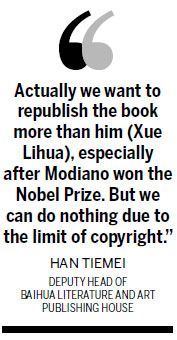French writer Patrick Modiano's recent Nobel Prize in Literature reopened old sores for Xue Lihua, the first person to translate Modiano's best known novel Rue des Boutiques Obscures into Chinese in book form.
In that book, published some 30 years ago, the translator's name was confused and the error left Xue permanently disappointed as the book's copyright has been transferred, so the mistake is unlikely to be corrected.
Now in his 80s, Xue moved to France to live at the end of 1985, and said he translated the novel a few months before that.
He told Guangzhou Daily he first came across the original version of the novel at a foreign affairs event by chance. "I kept the book and started to translate it in my spare time," he said. "The 232-page book took me three months to finish."
He recalled that in October of that year he showed his translation to an editor from Tianjin-based Baihua Literature and Art Publishing House in Shanghai, who said the work was "very good" and took it away. "But he did not mention anything about publishing it," Xue said.
When the translation was published in February 1986, Xue was already in France and heard the news from a friend. What made him angriest was that another person's name appeared on the title page as the translator, although Xue's name appeared on the cover.
Xue later learned that the other person, Huang Yushi, was an English translator who did not know French.
"I then wrote seven or eight letters to the publisher but got no response," he said. "I don't know how it was published or how much I should have been paid. It just happened."
In 2010, Xue decided to contact the publishing house again to clarify the matter. He dealt with Han Tiemei, deputy head of the publisher and then director of the editor-in-chief's office.
Han said staff immediately searched their archives when Xue contacted her, but found some materials were missing because the company had moved location in 2003.
Unable to identify the true translator by looking into the archives, they had to ask the editors who dealt with the book.
An art designer for the book's cover said he was sure he saw Xue's name when he received the sample copy, but he did not design the title page.
Lou Yi, the editor in charge of the book, confirmed that the error was a printing mistake. "We put another translator's name on it carelessly," she said.
Xue asked if they could republish the book and correct the error, but Han told him the book's copyright in China was acquired by another company in 2008, so the Tianjin publisher could not make any promise but would issue a statement confirming Xue was the translator of the 1986 edition.
"Actually we want to republish the book more than him, especially after Modiano won the Nobel Prize," Han said. "But we can do nothing due to the limit of copyright."
Han added that Xue did not ask for payment. She said the book was priced at only 1.3 yuan (38 cents in 1986), and few copies were printed, so any payment would not be high. In addition, neither side found a publishing contract.
However, Han said the publisher "will try its best to resolve the prolonged headache of the old translator via other approaches".
Although upset about the confusion about his name and the transferred copyright of the book, Xue said he was excited to learn Modiano had won the Nobel Prize.
"I was probably one of the first translators who introduced Modiano to Chinese readers," he said. "His words are graceful, smooth and fascinating. That's why I decided to translate Rue des Boutiques Obscures in the first place."
zhangzhao@chinadaily.com.cn

